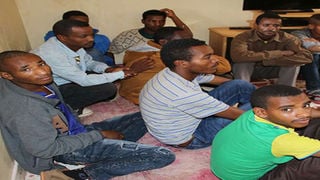
Ethiopians arrested in Kahawa West on March 9, 2016 for being in the country illegally.
| File | Nation Media GroupNews
Premium
Kenya a big transit point for human traffickers
If you walk into hair salons, barbershops and nail bars in the city and its outskirts, you will find many Burundians employed to pamper and groom you.
So majestic is their art that high-end salons, and some regular ones, in Umoja, Ongata Rongai and Donholm prefer them to locals.

Those that have made enough savings over time have opened cheaper nail bars on Tom Mboya Street and their fame has kicked a sizeable number of local nail technicians out of town.
Clients prefer them because their services are great and they seem to have more patience than their Kenyan counterparts.
However, it is emerging that some are in the country illegally, courtesy of our porous borders and corruption.
“When you ask them how they came into the country, some say they are in search of greener pastures after offending their government. Here, they have found a means to eke out a living and settle with their siblings. They train one other and survive,” a client told the Nation.
Security agencies nationwide have arrested more than 100 illegal immigrants in March alone.
According to data seen by the Nation, majority of the foreigners were Somalis, Ethiopians, Burundians and a few Mozambicans.
While a majority were arrested in the border counties of Garissa, Isiolo, Tana River, Wajir and Mombasa, others were seized at the Jomo Kenyatta International Airport (JKIA) in Nairobi.
Recent statistics on illegal immigrants are hard to come by since police stopped releasing the annual crime report in 2018.
But by that time, official data indicated the numbers were on the rise, and going by reported arrests during recent swoops, it would appear the trend has continued.

Nepalese women arrested during a raid at Nyali Police Station in Mombasa.
In 2018, 2,173 foreigners were arrested for being in the country illegally. The highest number of those arrested were Tanzanian and Ethiopians, who accounted for more than 40 per cent.
In 2017, 915 foreigners had been arrested, the majority being from Ethiopia and Somalia, while Nairobi and Busia counties recorded the highest arrests.
And in 2016, Nairobi and Busia counties, too, recorded the highest number of arrests of illegal immigrants.
According to police reports, Mombasa and Eastleigh in Nairobi constitute East Africa’s hub for the smuggling of immigrants as well as for the trafficking of women and children for prostitution and other forms of forced labour.

Some of the 80 Ethiopians arrested in Kangeta, Igembe South constituency in Meru County on August 18, 2015. Marsabit court on March 14, 2016 fined 18 Ethiopians Sh30, 000 each or serve three-month jail term for being in Kenya illegally. PHOTO | DAVID MUCHUI | NATION MEDIA GROUP
“Vehicles that transport miraa (khat) from Kenya to Somalia return with young girls and women who end up in brothels in Nairobi or Mombasa, or who are then shipped to other parts of the world. They form part of the many thousands that are trafficked every year,” read the 2016 police report.
A crackdown on illegal immigrants in 2015 led to the arrest of 1,878 illegal immigrants, majority being Ethiopians (1,085).
The 2020 Trafficking in Persons Report also says the 492,802 refugees and asylum-seekers hosted in two Kenyan camps -- Kakuma refugee camp and Dadaab refugee complex -- are exposed to exploitation, including sex trafficking.
Given they are generally required to live within the camps and have limited access to education and livelihood opportunities, the report notes, they are vulnerable to abuse.
“Children from East Africa, South Sudan, and Nepal are exploited in forced labour and sex trafficking in Kenya,” says the report.
“Stakeholders assert domestic workers from Uganda, pastoralists from Ethiopia, and others from Somalia, South Sudan, and Burundi are subjected to forced labour in Kenya when Kenyan youth vacate jobs to be educated and business owners need employees quickly,” it adds.
Debt-based coercion
“Recruiters use debt-based coercion to force Nepali, Indian, and Pakistani women to work in mujra dance clubs in Nairobi and Mombasa, where they are forced to pay off the debt by dancing, and through exploitation in the commercial sex industry.”
Political tension, conflict and natural disasters have been blamed for East African region’s large refugee and displaced populations.
With Burundians fleeing political tensions and election violence since 2015, around 383,000 citizens have found refuge in neighbouring countries.
By April 30, 2020 the United Nations High Commissioner for Refugees (UNHCR) had registered a total of 912,691 refugees from Congo, majority of whom have since settled in the Eastern Africa region.
In Ethiopia, ethnic tensions, political persecution and environmental disasters such as drought and soil degradation have forced millions to flee their homes in recent years.
In Somalia, war, political insecurity and environmental factors, including drought and famine, continue to force Somalis to leave their homes.
The UNHCR reported that by May 2020, 761,276 Somalis had sought refuge in neighbouring countries including Kenya (35 per cent), Ethiopia (26 per cent) and Uganda (5 per cent) as the rest fled to Yemen.
By 2019, 2.2 million South Sudanese refugees were living mostly in Sudan, Ethiopia, Kenya and Congo, after escaping their country’s civil war and critical food insecurity.
Immigration consultant and lawyer George Mati Mucee also notes that the presence of other East Africa member states’ citizens in Kenya may be linked to the East Africa Community agreement that workers found in either of the country be facilitated to get proper documentation or get escorted home.
Mr Mucee says the 100 arrests in March are just the tip of the iceberg as many more foreigners evade the dragnet.
“As a country, we are weak on enforcement. The authorities will only speak of the challenge when an attack happens. Before then, its business as usual. Even Kenyans do not question who they find along the streets. Being strict doesn’t mean chasing them away, but ensuring that they are here legally,” said Mr Mucee.
DCI’s head of Anti-Human Trafficking and Child Protection Unit (AHTCPU) Mueni Mutisya, however, says restrictions in movements brought about by the Covid-19 pandemic have resulted in a decline in illegal immigrants.
“The leading push factor is normally poverty, with people seeking economic opportunities in Kenya but the numbers have declined with the pandemic,” she noted.
At the beginning of the month, five Burundi nationals namely Akumuremyi Dancile, Kanyambo Zaitun, Habonimana Noeza, Barakamfitiye Vumiliya and Ndunimana Angele were intercepted at JKIA’s primary screening yard, with police reports indicating that they could not explain how they entered the country.
The multi-agency team at the airport handed them over to the Immigration department for further action.
The following day in Bamburi, Mombasa County, four Filipinos -- Canete Ronaldo Gaylan, Palaganas Eduardo Suarez, Panares Renante Guylan and Mervin Magallanes were arrested by Kenya Wildlife Service Marina Park officers for engaging in unlicensed fishing without authorisation in a wildlife protected area.
On the same day, in Kitui County, a multi-agency team on duty at Musingi area on the Thika-Garissa highway intercepted a Garissa Coach Sacco vehicle that was heading to Nairobi, with a 25-year-old Somali woman namely Kafiyo Ahmed Mocow, who was in possession of an ID card bearing a different name. She was placed in custody for further profiling and verification.
On March 5, in Kibusu, Tana River County, DCI detectives based at Garsen police station arrested 16 suspected foreigners who were being ferried to Malindi in two cars. They included 11 children aged between two and 14, and five adults aged between 25 and 35.
On March 5, in Empaash village, Kajiado County, police arrested 69-year-old German, and found a shotgun with 28 live rounds of ammunition in a green steel box hidden in a thicket outside his rental house.
Upon interrogation, the officers discovered that the foreigner did not have a firearm licence.
Later that day in Nairobi, an operation on human trafficking in MM apartments at Fedha estate, led to the arrest of 27 Burundian women who did not have any identification documents.
Trafficked to Middle East
Also arrested was the tenant of the house in which the women were found, with reports indicating that the house acts as a holding place ahead for people being trafficked to the Middle East.
Additionally, a Kenyan working as an operations officer at a regional airline was intercepted by customs officials at JKIA for being in possession of a parcel that contained 16 passports sent from Somalia.
The official had just landed in Nairobi from Mogadishu bearing the passports of 15 women and one man.
On being questioned, the person claimed that the parcel was to be received by one Jama, who was waiting around Terminal 2, but who disappeared in unclear circumstances.
The matter was handed over to ATPU.
On March 7, an operation in Wajir town led to the arrest of 23 Ethiopians.
On March 11, a multi-agency team in operation at Katumba in Kitui County, arrested four Somalis for being in the country illegally. The two minors and two adults were on transit from Garissa to Nairobi.
Three Kenyans who were with them were also arrested and the car they were using, a grey Toyota Sienta, detained.
On the same day, within Dadaab market, DCI officers arrested Suleiman Haji Abdi Fanah a Somali national who was in possession of a South African passport. He was booked at Dadaab police station and the case handed over to the ATPU.
Later, at around 3:30pm, inside Freedom Airline aircraft, Registration No 5Y-FAN which had arrived from Somalia, KRA Custom officers found 28 Somali passports.
Preliminary investigation established that the passports were sent from Mogadishu as a parcel. The case was also handed over to ATPU.
On March 16, a multi-agency team on operation at Ngutani on the Thika-Garissa highway intercepted a vehicle that was found ferrying three Somali girls from Garissa to Nairobi.
A 2018 National Crime and Research Centre report on borderland-related crimes and security threats in Kenya identified corruption within security personnel amongst the leading contributors to crimes along the country’s borders.
The report noted that traffickers are able to fraudulently obtain identity documents from complicit Immigration and National Registration Officers, while police officers take bribes to warn traffickers of impending operations and investigations.
Mr Mucee notes that there is cause for concern when illegal movements between Kenya and Mozambique start to increase because of the country’s link to the Isis-linked terror group known as Ansar al Sunnah.
“The inclusion of Mozambique in this is curious, it may point to the shifting axis of al-Shabaab sympathisers choosing to abandon the now stricter Kenya-Somali borders for Mozambique to join Isis,” said Mr Mucee.
According to the International Organisation for Migration’s migration data portal, Kenya was holding 1.1 million international migrants at mid-year 2020, majority of them having arrived in the country in search of economic opportunities.





